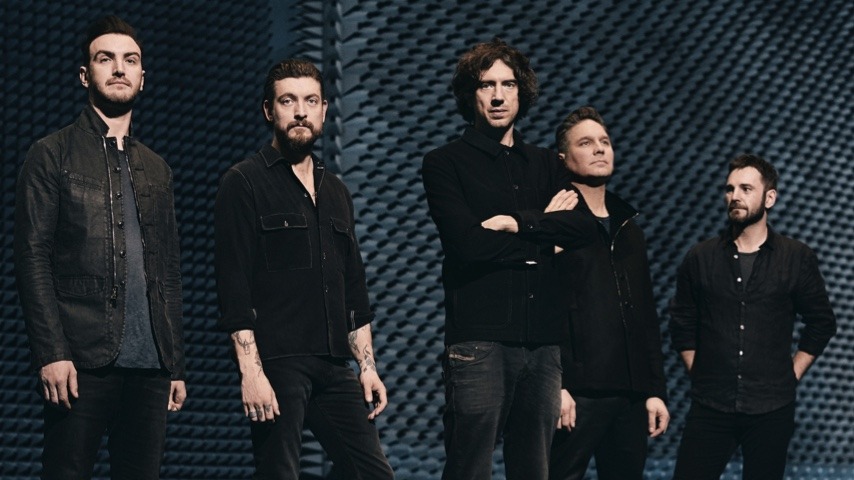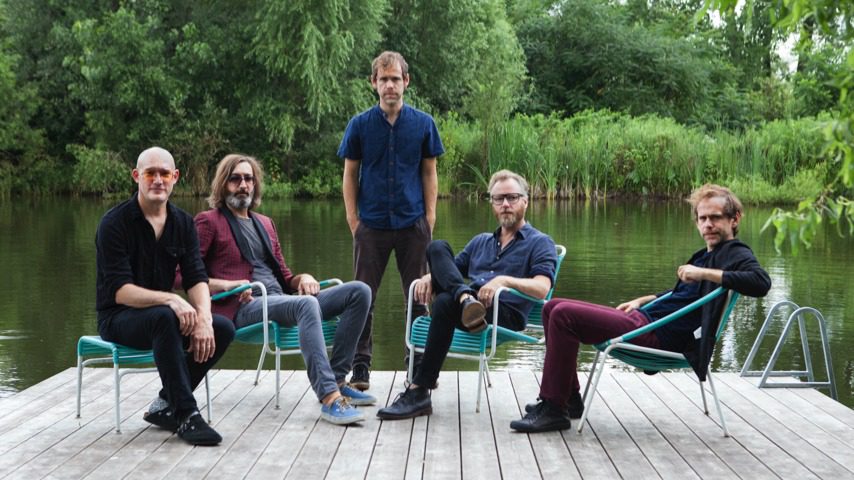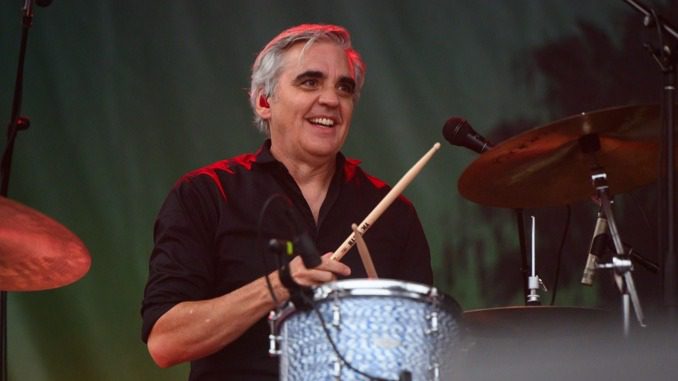Gary Lightbody readily admits it—even in these dark post-pandemic times, his everyday existence often resembles a kooky 1980’s TV sitcom, revolving around his close-knit family. Back home in Northern Ireland, the Snow Patrol frontman lives in a house right next to his mother’s, which is sandwiched on the other side by his sister’s digs. And still—at 44—this king of the windswept romantic power ballad has yet to settle down with a steady girl, no matter how hard he’s tried to make various relationships work over the years.
“And it’s not gonna happen in lockdown, that’s for sure,” he sighs. “But yeah, I’ve been on my own for quite some time now. And I know it sounds funny, the whole situation, and it would make for good television, probably.”
As is the man’s current situation—sheltering in place in Los Angeles after flying over to compose with an unnamed California artist, only to discover that their collaborations didn’t make the final cut and the album is readied for release. “It’s just one of those things,” he says. “Every co-writer will tell you the same story—only one song in every ten makes it onto an album, so unfortunately mine didn’t make it, and once lockdown was called I ended up stuck here. But I’ve been working on a whole host of other stuff on my own since the lockdown happened, and I’ve been making music through this whole thing, really.”
Like, for instance, the unusual new The Fireside Sessions EP he’s just released, attributed to Snow Patrol and the Saturday Songwriters and with proceeds going to The Trussell Trust, an anti-poverty charity focused on food banks. And Lightbody came up with a novel concept: Every Saturday for 11 weeks straight, he welcomed songwriting input on his Instagram livestream, completing one entire tune during the Saturday Songwriters over the course of an hour, with as many as 5,000 fans suggesting lyrics, chords, and melodies. And it worked—featured EP tracks jangle like prime Snow Patrol, but sometimes trot at the pacing of his more pastoral side project, Tired Pony. And none—from the gentle strummer “Light Years” to the chugging “Reaching Out To You,” a lilting “The Curve of Earth,” a banjo-clucking “Dance With Me,” and an anvil-chorus “On The Edge Of All This”—get bogged down in despair and darkness, but instead trumpet the dawn, sunlight, peacefully silent streets, vast blue empty skies, and above all else, the verdant pulse of revivified nature. A song in an hour? Not bad, considering Snow Patrol’s last magnum opus, 2018’s Wildness, took seven excruciating years to complete. Lightbody is back, stronger than ever, with quite a few new tricks up his sleeve.
Paste: So your first reaction to the co-write nixing was, “But Rihanna! You promised!”
Gary Lightbody: Ha! I’m not gonna say who it was. And it wasn’t Rihanna. But I did send Rihanna a song—not directly to her, but to her management—and it didn’t go through. I mean, we were dreaming, but I was like, “I think this would really work for Rihanna!” The song was called “Sing to Me,” and it was a ballad, but we thought it would be brilliant for her voice. And the management company got back to us at one point and said it was too late, and maybe that was just a nice way of saying No. But they certainly were not dismissive of it. But it was a pipe dream. So I’ve always wanted to work with Rihanna, but it hasn’t happened yet.
Paste: What are some of your collaborations that might surprise Snow Patrol fans?
Lightbody: I’ll tell you a story of one that didn’t happen. I didn’t want to tell it before, because I didn’t want to interfere with the album cycle. But me and Johnny [McDaid, band guitarist] got to work with Adele on her last album. And it was amazing. We spent two days with her and we wrote three songs. And Johnny and I were working on some music and she was writing away on lyrics and kind of gently singing to herself—she hadn’t really sung yet on that first day. And then she said, “Okay—I think I’m ready to sing it.” And then she started singing the song, and you’re just in the room with her, myself and Johnny. And when she started singing, I was just completely overcome with emotion—it was the most extraordinary thing I’d ever heard. And she was so close! I turned away from her, thinking, “Oh, my God—I’m going to cry!” And I looked at Johnny, and there tears in his eyes, as well, so I turned my back on both of them and just stared out the window, trying to make sure nobody saw me crying. But the tears just came tumbling out. It was an incredible moment. But that song never got finished, so it was never in contention for her album, which is a shame. But it was such a beautiful moment, and I will never forget it.
Paste: Have you noticed—in the wake of COVID-19—more people looking up to the night skies, the moon, constellations? It’s almost like a return to paganism. It’s there in your new songs, for sure, like “Light Years” and “The Curve of Earth.”
Lightbody: Yeah. And in the heart of the lockdown, people were paying more attention to nature and the sky above and the world around them in a way that they hadn’t before. I know I certainly was. And those lyrics that were coming in—almost all the lyrics on the EP are from the fans, and I just kind of pieced them together. And so many of them were nature-bound, or odes to nature, and it must be very beautiful to be out in the middle of it, with poetry like that coming in from everybody. And I hear the bears are back out, too. I went for a hike the other day, and I heard rustling, and it certainly sounded bigger than tiny animals or birds—it felt like a presence of something, something very unusual. So I just kept walking. I love nature, but I wasn’t about to try to find out what was in there.
Paste: Ever consider starting a new relationship during lockdown? I’m sure plenty of potential dates have reached out to you, via computer.
Lightbody: Meeting someone online is not my scene. People sometimes send me pictures from their profile page, and it seems to be legitimate, but I’ve never gone on those sites. I’m trying more and more to keep myself off social media—never mind dating sites — trying to do it less and less. I’m just concentrating on writing and watching great movies. But mostly writing—I’ve written so many songs in the last four or five months. And to be honest, I’ve been writing about my dad a fair bit—my dad passed away just before Christmas, so I’ve been writing about that quite a lot, and I think I might have a whole album of songs about him. So it’s not going to be a typically cheery album, but it’s also a cathartic thing for me, and it might ring true with other people to, you know. It won’t be a Snow Patrol record, though—that’s for sure. And I’ve been writing about home. I miss home, and all the people in my life. So it’s been a great way to stay connected to things.
Paste: What wisdom have you gleaned from all this?
Lightbody: I feel a glass-is-half-full optimism now. I do feel hopeful, and I’ve been speaking to a lot of friends and we’ve been keeping each other buoyant. We’ve tried to start a thing in Northern Ireland with a group of people from the Northern Irish music industry to petition the government for funding for musicians. Because thinking about other musicians making their way through this, I mean, Snow Patrol went the first 10 years of our career with no success. And if you piled a coronavirus on top of that? There’s no way, no way we’d make it now. So I have to remind myself of that all the time—that there’s no way 90% of the bands in Northern Ireland will make it through this, unless they get help from the government, and also each other. And that’s one of the greatest things about this current scene—which is different from when I was growing up—is that it’s such a collaborative, connected thing. Kind of like the Glasgow music scene when I lived in Glasgow—everybody was playing on each other’s records. And that’s the way the Northern Irish music scene feels now—everybody’s got each other’s backs, everybody’s trying to lift each other up, and it’s a beautiful thing, and it’s got a kind, kind heart.
Paste: Through your own Lightbody Foundation charity, you just personally donated 50,000 pounds. To whom?
Lightbody: That particular donation was to help musicians. But that’s just the tip of the iceberg, really. Donations like that will help a few people, but it’s the big donations from the government that will change people’s lives. And of course, the government needs to support so many different industries, but we’re just reminding them that music and culture and the wider art world are very, very important to preserve, as well, because we need things to look forward to. And those are the things that everybody can’t wait to get back to—going to gigs and going to the theatre and things like that, when life’s doors inevitably open up again. So it’s just me trying to preserve that as much as we can. It’s just one of those things that you think about when you’ve got time on your hands to think, you know?
Paste: And you also donated $90,000 to nine American causes just last month.
Lightbody: It was just things that were important to me, like equality, justice, and peace, where everybody gets a fair shot—I’ve believed that since I was a kid. I grew up in Northern Ireland, a place that was at war with itself. And actually, we just lost a great man yesterday, John Hume, who was one of the architects of the peace in Northern Ireland—he passed away yesterday. So things like that remind you just how important peace is, and that everybody gets to experience life in a fair way. So any cause that’s trying to create fairness for people? I’m all for it.
Paste: But you got to cover “Into the Mystic” for Hot Press’ current Van Morrison 75th birthday celebration?
Lightbody: We just got asked to do that. And what they asked me “What song do you wanna do?” I just thought “Into the Mystic” would have already been taken by someone, but it wasn’t. So it was amazing. Van Morrison is a massive part of my life—always has been. It’s almost like he’s part of every Northern Irish person’s DNA.
Paste: Your last album took seven laborious years to make, after you overcame writer’s block. Is that block completely gone now?
Lightbody: It certainly feels like a distant memory, and I hope it remains so. But it’s like, “How did I not know how to do this for so long?” But I also don’t want to get complacent or arrogant about it, because I’ll always try and remember that it happened. Whether I remember exactly how I felt at the time, it doesn’t matter—I just want to remember that it did happen, because I don’t want to ever be in a situation where I forget how I got out of it the last time. And you get out of it by graft. You have to keep writing and writing, all the shit, shit, shit stuff that you’ve got in your head flows onto the page until the good stuff starts coming out. And for too long, too many years of that seven years, I sat and stared at the screen, afraid to write, or closed my laptop, too afraid to write, or just avoided it altogether and went and got drunk. And only when I got sober did things start to change, and I realized I had to work my ass off to get back to where I was. And you kind of forget that—inspiration is important for great songs, but working hard is more important, because you’ll forget pretty quickly where you came from if you don’t work hard. But I also do have to remind myself that it’s supposed to be fun—I got to live the dream life that I always wanted to live, and sometimes I forget that and get caught up in anxiety and fear. I have to remind myself that I kind of won the lottery, and I should never take that for granted.
Paste: When you’re looking at all these lyrics for the EP coming in, were there some that were just too weird to work in?
Lightbody: I wrote down everything, and there was no editorial process in the [beginning]. I literally looked up, wrote down the thing I saw, looked up again, wrote down the next thing I saw, and then I put them all together afterwards. And the weirdest one? Somebody just said, “What the fuck is this?” And I think what happened was, they’d come onto the livestream expecting to see a gig, and they were just watching some guy write down all the things people were saying. And some people requested songs—obviously they thought it was a gig. And you then have to go, “Oh, sorry—this is a writing session,” then give them a quick explanation. And hopefully they’ll hang around and join in.
Paste: All of the thoughts seem to converge on light overcoming darkness, nature reasserting itself, with man assuming a much smaller, more insignificant role. And it should be clear to everyone by now—Man in his arrogance in thinking he’s the end product of evolution has doomed himself to extinction. And it might be too late to turn it all around.
Lightbody: I genuinely think we can turn it around, I genuinely do. And it’s a harsh lesson to learn, very harsh for a lot of people. But start with kindness, and then move from there.




